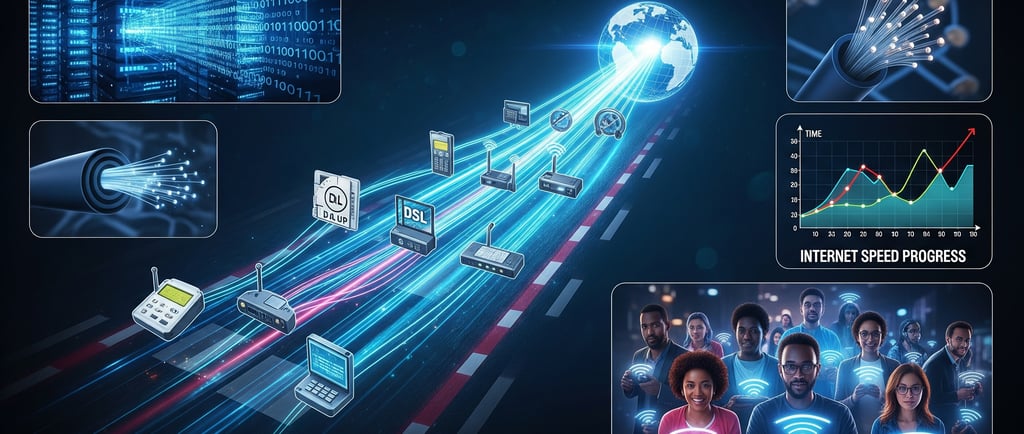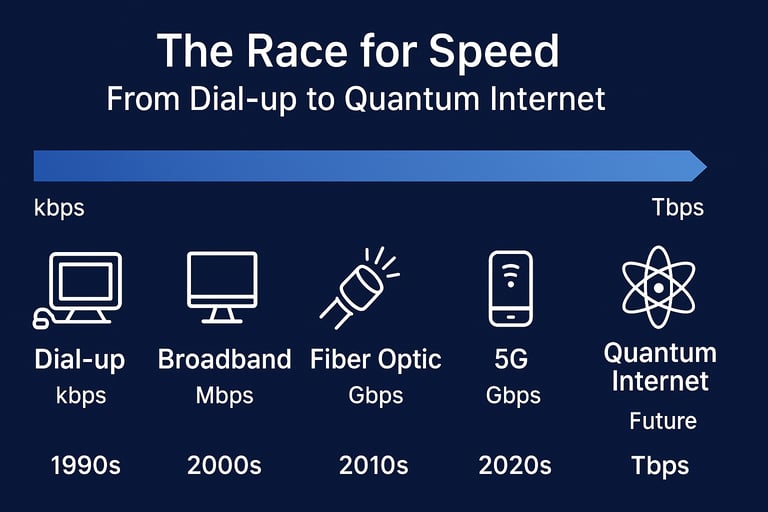The Race for Speed: Why the Internet Keeps Getting Faster
The world’s demand for speed never stops. From fiber optics to quantum networking, scientists are pushing the boundaries of how fast data can travel. But is faster always necessary? This article explores why internet speed matters, the innovations behind it, and what the future of lightning-fast communication could mean for AI, business, and everyday life.
AI FOR TECH MINDED
Robin Lamott
9/1/20254 min read


When you open a browser, stream a video, or ask ChatGPT a question, it feels instant — almost magical. Data leaves your device, travels across the world through glass fibers or satellites, and returns with an answer in less than a blink. It’s so fast that most people don’t even think about it.
But behind the scenes, there’s an ongoing race — one driven by scientists, engineers, and global companies — to make data move even faster. The question is: why? Do we really need the internet to be faster than it already is? And where could all this innovation take us?
Let’s dig into how internet speed works, why it keeps increasing, and what the future of ultra-fast connectivity looks like.
⚡ A Brief History of Internet Speed
The internet has evolved from painfully slow dial-up connections in the 1990s to the blazing speeds of fiber optics today. Here’s a quick timeline of how far we’ve come:
1990s — Dial-up connections
Speeds of 28–56 kbps. Sending a single picture could take minutes.2000s — Broadband
DSL and cable internet hit megabits per second (Mbps), finally making video streaming possible.2010s — Fiber optics
Gigabit speeds became available in some areas, and mobile networks advanced from 3G to 4G LTE.2020s — Beyond gigabit
Fiber-to-home speeds, 5G mobile, and experimental hollow-core fiber are pushing into the terabit per second territory in labs.
Every leap forward in speed opened up new industries and possibilities — from YouTube to telemedicine, from cloud computing to AI-powered assistants.
🌐 How Do We Send Data So Fast?
The secret lies in fiber optics, the backbone of the internet. Inside thin strands of glass, data is encoded as pulses of light (photons). A laser “fires” the photons, and devices modulate (encode) information onto the light waves, almost like Morse code at light speed.
Standard fiber: Light bounces inside the glass, guided by reflection.
Hollow-core fiber: Light travels through air instead of glass, reducing delay.
Quantum research: Experiments use entangled photons that could, in theory, transmit information faster and more securely.
The result? Data moves at nearly the speed of light, across oceans, through underground cables, and even via satellites.
🚀 Why Do We Keep Pushing for More Speed?
If the internet already feels instant, why make it faster? There are several big reasons.
1. The Data Explosion
Every day, humanity produces over 300 million terabytes of data — from photos and videos to business records, social media posts, and scientific research. Without faster infrastructure, networks would choke under the load.
2. Real-Time Applications
New technologies demand millisecond precision:
Self-driving cars make split-second decisions.
Remote robotic surgery.
VR/AR systems that need seamless responses to avoid motion sickness.
AI chat assistants that answer in milliseconds.
3. AI and Machine Learning
Training AI models requires moving trillions of calculations across networks. Faster infrastructure reduces costs, power use, and training time — making more advanced AI possible.
4. Global Connectivity
Billions of people are still coming online, especially in Asia, Africa, and Latin America. Faster tech helps bridge the digital divide, allowing rural areas to connect to the same opportunities as big cities.
5. Future-Proofing
Just like highways need to be expanded as more cars hit the road, networks must get faster as more devices, apps, and industries rely on them.
⚖️ Is Faster Always Necessary?
Not every activity benefits equally from speed.
For emails, reading blogs, or casual browsing, current speeds are more than enough.
For high-frequency trading, AI-driven weather models, or real-time military defense systems, shaving off just a millisecond can mean billions of dollars or lives saved.
So while faster internet won’t change your online shopping, it’s absolutely vital for the industries shaping the future.
🔬 The Cutting Edge of Internet Speed
Researchers are working on mind-bending innovations that could define the next era of connectivity.
Hollow-Core Fiber
Trials show up to 30% lower latency than traditional fiber, moving us closer to “true” light speed communication.Quantum Internet
Using entangled particles to transmit information instantly and securely. Still experimental, but it could revolutionize cybersecurity.6G Networks
Building on 5G, 6G is expected to reach speeds of 1 Tbps and enable advanced applications like holographic communication.Neuromorphic Hardware
Chips modeled after the human brain are being built for AI, with faster, more energy-efficient processing.
🌍 Who’s Racing to Build It?
Tech giants like Google, Meta, and Microsoft are laying new undersea cables across the globe.
Telecom companies are rolling out 5G and working on 6G infrastructure.
Research labs in the US, Japan, and Europe are testing terabit and quantum networks.
Startups are exploring new chip architectures, satellite constellations, and hybrid fiber-wireless systems.
This isn’t just about bragging rights — it’s an arms race with economic, political, and military stakes.
⚡ What Faster Internet Enables
Every major leap in speed creates new possibilities we couldn’t imagine before. Here are just a few things that faster networks could unlock:
Realistic holograms for meetings, concerts, and events.
Brain-computer interfaces allow paralyzed patients to communicate instantly.
Global “digital twins” of cities, weather systems, or even the Earth itself are used for planning and science.
Truly immersive virtual worlds with no lag.
Unhackable quantum communication for governments and banks.
🌌 The Road Ahead
The truth is, humanity is only scratching the surface of what speed can enable. Faster internet isn’t just about Netflix loading quicker — it’s about unlocking entirely new dimensions of communication, science, and creativity.
As we race toward a quantum-powered, terabit-speed future, one thing is clear: the internet will continue to evolve, and with it, the way we live, work, and connect.
✨ Final Thoughts
The internet may already feel instant, but history shows us that each jump in speed opens doors we never knew existed. From streaming to AI, from global trade to medical breakthroughs, faster data transfer is the quiet force shaping the modern world.
So the next time you ask a question online and get an answer in the blink of an eye, remember: it’s not just about speed for today — it’s about building the foundation for tomorrow.


© 2025. All rights reserved.

